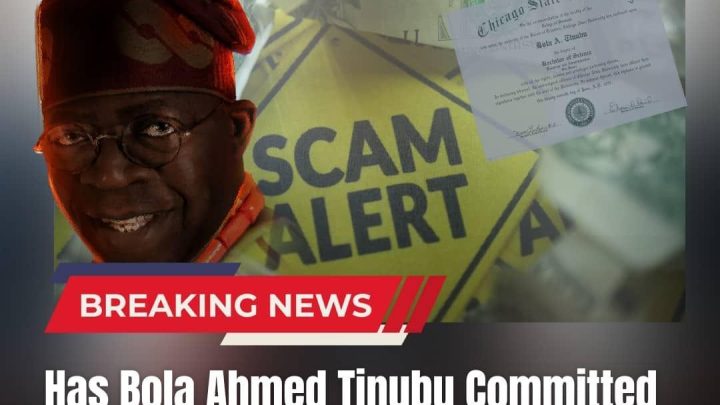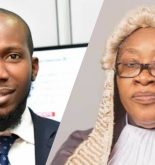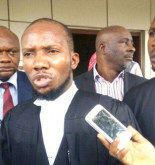By David Hundeyin
A criminal complaint bordering on issues relating to perjury on Bola Ahmed Tinubu’s Independent National Electoral Commission (INEC) Form EC9 has been filed at the Magistrate Court of the FCT sitting at Zone 6 by a lawyer and civil advocate Barrister Mike Enahoro-Ebah. Attached to the request for criminal summons dated Thursday November 10, 2022, is damning evidence of wrongdoing by the APC presidential candidate including document forgery, perjury and potentially even an instance of identity theft
It will be recalled that on July 13, 2022, West Africa Weekly published a long-read investigative story about the All Progressives Congress (APC) presidential candidate Bola Ahmed Tinubu, and his links to heroin trafficking and money laundering in Chicago during the 1980s and early 1990s. Subsequently on November 13, 2022, West Africa Weekly published a documentary based on the story titled ‘Bola Ahmed Tinubu: From Drug Lord to Presidential Candidate.’
The new revelations are the result of months of collaboration between Barrister Enahoro-Ebah and the Chicago law firm Leahy, Eisenberg & Fraenkel Ltd. Working on a brief to verify Bola Tinubu’s U.S. academic and employment records as given on his INEC Form EC9 and in several media appearances, Matthew J. Kowals, an Attorney with the above law firm sent out attorney subpoenas to Richard J. Daley College (formerly known as Southwest College), Chicago State University, Anderson Tax and Deloitte LLP.
At press time, West Africa Weekly was able to get hold of responses to the subpoenas from Richard Daley College, Chicago State University and Deloitte LLP. The documents contained in the responses, which differ sharply from the documents and information submitted to INEC by Tinubu, make up the basis for the legal action filed by Enahoro-Ebah. Among the many discrepancies and omissions as outlined in the action are:
- Different dates of birth
- Failure to provide evidence of attendance of a school that appears on his academic record
- Failure to disclose a secondary citizenship
- Forgery of a university degree certificate and
- A potential instance of identity theft.
The Accusations Laid Out
According to the court documents which are available in full here, Tinubu’s INEC Form EC9 (AFFIDAVIT IN SUPPORT OF PERSONAL PARTICULARS – Particulars of persons seeking elections to the office of President of the Federal Republic of Nigeria), was not made available by INEC to Enahoro-Ebah when he requested for it, despite INEC being legally obligated to make it public. He subsequently filed a lawsuit against INEC (FHC/ABJ/CS/1337/2022), which was resolved in his favour on August 22, 2022
After beating INEC in court, he engaged Leahy, Eisenberg & Franekel Ltd to verify Tinubu’s U.S. records as stated on the sworn affidavit. The responses to these subpoenas, which were made available to West Africa Weekly shortly after the filing of the court process, show evidence that the APC presidential candidate committed perjury on his Form EC9, which could be grounds for criminal prosecution.
Further, Enahoro-Ebah says that when the discrepancies between the documents subpoenaed from Chicago State University and the documents submitted to INEC were pointed out to the university, a lawyer in the United States suspected to be working for Tinubu, contacted Leahy, Eisenberg & Franekel Ltd, asking them to “destroy” the documents.
Speaking exclusively to West Africa Weekly, Enahoro-Ebah said:
“Chicago State University was cooperative until we sent them the INEC copy of the certificate pointing out the differences and asking them if they issued this. Next thing we knew, an outside counsel contacted our lawyer asking that we “destroy” all documents because he made a technical error in the subpoena or something silly like that. So he [Tinubu] is currently fighting back from the US.”
Enahoro-Ebah
True or False? Examining The Evidence
While it is not listed on his INEC EC9 affidavit, Tinubu has repeatedly claimed that he was recruited by global consulting firm Deloitte immediately after graduating from university in 1979. There, as an entry-level consultant fresh out of university between 1979 and 1983, he allegedly saved up the sum of $1,800,000 from salary and bonus payments alone.
To verify whether this actually happened, Leahy, Eisenberg & Fraenkel Ltd issued a subpoena to Deloitte LLP on September 16, 2022, requesting all information held on file about Bola Ahmed Tinubu.
The response, which came on September 20, 2022, was direct and unequivocal.
On his INEC Form EC9, Tinubu provided no details of his primary and secondary education, even filling in the relevant years as “0000”. Exactly why INEC permitted this clear violation remains unclear, but it could perhaps go some way to explaining the Commission’s reluctance to release certified true copies of the EC9 to the public.
To gain some clarity over Tinubu’s educational background, another subpoena went out to Chicago State University, where Tinubu claims to have obtained a degree in Business and Administration in 1979.
The documents that came back make up the bulk of what underpins Enahoro-Ebah’s criminal complaint against Bola Tinubu. First of all, on his EC9, Tinubu gave his date of birth as March 29, 1952.
On Chicago State University’s records however, “Bola A. Tinubu” has a different date of birth – March 29, 1954.
As mentioned above, Tinubu’s EC9 contained no details of any secondary school attended in Nigeria. On it, he also affirmed that he has no nationality other than Nigeria.
On Chicago State University’s admission records however, he claimed to have attended Government College, Lagos. He also claimed to be “Black American.”
This is important because there is a certain amount of ambiguity as to whether Section 137 of the 1999 constitution precludes certain public office holders including the president, state governors and members of the Senate and Federal House of Representatives from holding dual citizenship. What is known for a fact in any case, is that if Tinubu was indeed “Black American,” i.e. in possession of U.S. citizenship, that would mean that he committed perjury by failing to declare it on his EC9.
As bad as the above infractions look, they pale into insignificance compared to those that come next. For reference, as mentioned in West Africa Weekly’s July expose, there has been persistent controversy over Tinubu’s true identity prior to his arrival in the US. His refusal to include details about his Nigerian education on the EC9 affidavit has not helped to dispel persistent rumours that “Bola Ahmed Tinubu” could in fact, be an assumed identity.
This is worsened by what is revealed on the following document included in Chicago State University’s responses to the subpoena. The document is an academic transcript for “Bola A. Tinubu” from Southwest College (later renamed Richard J. Daley College), which was used to process his admission into the university. On it, the sex of “Bola A. Tinubu” is clearly marked “F.”
Since US law in the 1970s only permitted individuals to legally reclassify their gender after gender reassignment surgery (M.T. v J.T. 1976), it is safe to preclude the possibility that the person now known as “Bola Ahmed Tinubu” once identified as a woman. This raises all sorts of questions about who exactly the APC presidential candidate is, including the alarming question of potential identity theft, criminal impersonation and fraud.
Even more curiously, as stated by CSU, there are no records for Tinubu on file that contain clear information about who exactly “Bola A. Tinubu” was. No passport, no visa, no social security card, and no driver’s licence.
Still it gets even worse.
The following document was submitted to INEC alongside the EC9 affidavit as proof of Bola Tinubu’s degree at Chicago State University.
In response to the subpoena, Chicago State University reproduced and sent in the exact degree certificate that was awarded to him in 1979. That certificate can be seen below. Evidently, both certificates are completely different.
A line-by-line analysis of the original certificate versus what Tinubu submitted to INEC reveals the following glaring discrepancies. First of all, both certificates are written in completely different font types. It is important to note that the certificate provided by CSU in response to the subpoena is an exact reprint of the original certificate issued in 1979.
This means that any other certificate purporting to be the same one with even the slightest deviation in style, format or content, can only be a fake.
Next, the certificate submitted to INEC has 2 grammatical errors on it. It says: “On the recommendation of the faculty of the college of business, and under the authority of the board of trustees of Chicago state university has conferred upon…” This is a meaningless and incomplete statement. What the original document provided by CSU actually says is “On the recommendation of the faculty of the college of business and under the authority of the board of trustees, Chicago State University has conferred upon…” That is a grammatically correct statement with meaningful sentence construction.
The certificate submitted to INEC then says “In testimony thereof, the undersigned officers of Chicago State University have affixed their Signatures together with the seal of the University in witness thereof this Diploma is granted this twenty-second day of June A.D. 1979.” This is another meaningless and incorrect statement. What it should say, per the original on the left is “In testimony thereof, the undersigned officers of Chicago State University have affixed their Signatures together with the seal of the University. In witness thereof, this Diploma is granted this twenty-seventh day of June A.D. 1979.”
Both documents also have clearly different logos on them. Once again bear in mind that the certificate obtained from CSU via subpoena is an exact reprint of the original issued certificate. This means that the logo on the left must appear in Tinubu’s certificate even if Chicago State University has changed logos 75 times since 1979.
In any case, Chicago State University’s only other known logos since then can be found below. Where exactly the logo on Tinubu’s certificate originates from is anyone’s guess.
And then there is the layout of both certificates. At risk of excessive repitition, it must be noted once again that the certificate on the left is an exact replica of the certificate issued by Chicago State University in June 1979. Any deviation from what is on it can mean only one thing – forgery.
Finally there, is the crowning touch that proves without a doubt that Bola Tinubu submitted a forged certificate to INEC – the date on his purported certificate is different to that on the reprinted certificate obtained via subpoena from Chicago State University. Whereas the original on the left states that the degree was awarded on June 27, 1979, the certificate Tinubu submitted to INEC states that the degree was awarded on June 22, 1979. All of this points to one clear conclusion – the “certificate” on the right is a forgery.
Editor’s Note: Shortly after this story was published, it came to our attention that the forged certificate submitted to INEC by Bola Tinubu appears to have originated from an online fake diploma design service called diplomamakers.com.
A search of the Diploma Makers repository on Pinterest turns up dozens of fake university and college degree certificates including a Chicago State University certificate that is nearly identical in design and structure to that submitted to INEC by Tinubu.
Spot the difference.
Legal Implications and Political Reactions
Under Section 29 of Nigeria’s Electoral Act, 2022, providing false information on Form EC9 constitutes grounds for disqualification for an election provided another contestant files a suit at the Federal High Court seeking to declare the information provided as false.
While it remains unclear whether Tinubu will face any such challenge from within the APC or from presidential aspirants in other political parties, Barrister Enahoro-Ebah has chosen to file a criminal complaint against him, as provided for under Section 88 of the Administration of Criminal Justice Act, 2015.
West Africa Weekly spoke to Festus Ogun, a Human Rights lawyer and Managing Partner at FOLEGAL, to get his perspective on what the findings mean for the 2023 presidential elections. His comment is as follows:
“It beyond settled, under our extant electoral jurisprudence, that giving false information, under any guise, in one’s INEC FORM EC9 is a solid ground for disqualification of a candidate standing for an election in Nigeria. For the avoidance of doubt, Section 137(1)(j) of the 1999 Constitution of the Federal Republic of Nigeria, as altered, provides that “no person shall be qualified for election to the office of the President if he has presented a forged certificate to the Independent National Electoral Commission.
In my respectful view, the material discrepancies in the authentic certificate of Asiwaju Bola Tinubu and the completely altered one, submitted to INEC by Asiwaju Tinubu, has established a clear case of certificate forgery under the Constitution and he, therefore, stands the risk of being disqualified under Section 137(1)(j) of the 1999 Constitution. That said, as a constitutional lawyer, I know that it was not the intention of the framers of the constitution that we have a Nigerian President that rides to power under the pretext of a dubiously forged certificate
That singular fact alone endangers whatever is left of our country. Those who should run for political office must meet the qualifying requirements of law. Asiwaju Tinubu should either honourably withdraw from the Presidential race for obvious case of certificate forgery or he waits till he gets disqualified by the courts either before or even after the election. The issue of disqualification, under the Constitution, can be a pre-election or post-election matter.
On a final note, let it be stated that only an aspirant that actually participated in the APC primary election and or a political party that is participating in the Presidential election can challenge Asiwaju Tinubu’s forged certificate in court.”
Festus Ogun
Speaking exclusively to West Africa Weekly, AAC presidential candidate Omoyele Sowore excoriated Tinubu for having a “shady character” and an “opaque life.”
In his words:
“I have worked on exposing Bola Tinubu since 2008 by obtaining the drug forfeiture proceedings from the archive to which it was kept outside of Chicago, Illinois. I have also spoken extensively over his shady character regarding financial frauds in Lagos and his age falsification and opaque educational background and life in general. I do not, therefore, think for one second that Tinubu is qualified to be a Presidential candidate in 2023 or anytime for that matter.”
Sowore
In her reaction, Ndi Kato, Spokesperson to the Obi/Datti campaign described Tinubu’s candidacy as “disheartening.”
She said:
“It is absolutely disheartening that in the midst of all this, Tinubu is still framed as a formidable candidate in political discuss. From physical to mental health, education, early life etc., it is clear that Tinubu ticks no right box – not a single one. As a nation, we need to look at Tinubu as a candidate and ask ourselves if this is who we really are.”
Ndi Kato
Giving his reaction to West Africa Weekly, Paul Ibe, Media Adviser to PDP presidential candidate Atiku Abubakar described Tinubu as a “tainted character.”
He said:
“The allegations against Bola Tinubu, the candidate of the APC are too weighty to be glossed over. The presidency of Nigeria, a leader in the West African sub region and Africa, the most populous nation in the Black world is not deserving of a tainted character. If Tinubu still has any modicum of respect for himself and the office that he aspires to, he should do the needful.”
Paul Ibe
West Africa Weekly also spoke to Barrister Ladipo Johnson, spokesperson for NNPP presidential candidate Rabiu Musa Kwankwaso.
In his words
“I would like to believe that these allegations are untrue. However, they are so weighty and fundamental that one must let the Rule of Law come into play and take its course. Many would like to be partisan and wave the allegations away. But any citizen who truly loves Nigeria and puts the progress of Nigeria before partisanship would quietly let the rule of law take its course and either confirm or reject the allegations. It is sad that many of our politicians really do not understand or believe in DEMOCRACY. It could be a very difficult form of government that doesn’t really permit “my will be done”. It has its sets of rules and access to court and court proceedings are part of the principles and rules of democracy.”
Barrister Ladipo Johnson
This story will be updated as it develops.
West Africa Weekly is a reader-supported publication. To support independent journalism that goes where others fear to tread, consider becoming a paid subscriber.




